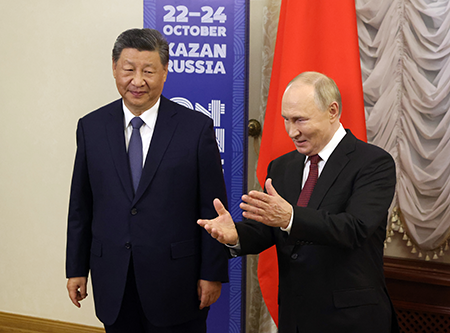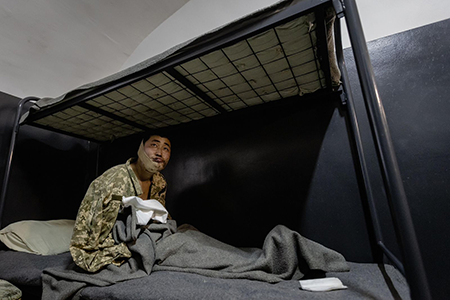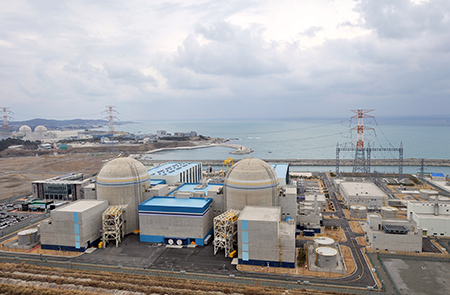May 2025
By Ulrich Kühn
Europe is in turmoil. Polish Prime Minister Donald Tusk is calling for his country to “reach for the most modern capabilities also related to nuclear weapons.”1 The incoming German chancellor, Friedrich Merz, finds that, “We need to have discussions with both the British and the French … about whether nuclear sharing, or at least nuclear security from the UK and France, could also apply to us.”2 In turn, French President Emmanuel Macron is ready to “open this discussion … if it allows to build a European force.”3 At the same time, the European Union Commission is suggesting a $900 billion package to “rearm Europe” with the latest weaponry while Germany has signaled that it could start spending more than $450 billion on defense. Not since the Cold War years have Europeans felt so threatened. Many wonder whether Europe and the United States are still allies.4
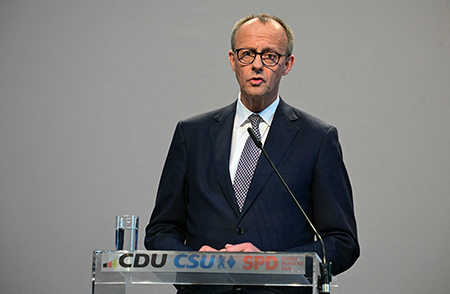
All this is the result of two men’s ambitions. The one sitting in the Kremlin, Russian President Vladimir Putin, is waging the bloodiest land war on European soil since the guns of World War II fell silent. The other one, U.S. President Donald Trump, re-entered the White House having pledged to end Russia’s full-scale war in Ukraine “within 24 hours.”5 His tactics include cozying up to Moscow, pressuring Kyiv into submission, and sidelining European allies. Putin turned up the heat in 2022 and Trump closed the lid three years later. Europe is a pressure cooker, and the temperature is quickly rising.
Frantic calls for European nuclear deterrence are hardly new. They were a constant background noise to Trump’s first four years as president,6 but this time is different. There is now a profound sense among Europeans that “Donald Trump will no longer uphold NATO’s mutual defense commitment unconditionally,” as Merz put it.7 Breaking with his predecessors, Merz is openly courting Macron, who for years had offered Europe-wide discussions on the role of French nuclear forces in European security. Another difference: Germany now brings the resources and willingness to invest serious money in defense. Some officials in Berlin have already hinted at German co-sponsorship of the French arsenal.8
Underlying all of this is an acute feeling that time is running out—that this is Europe’s last chance to stand on its own feet militarily; that Ukraine’s fate may ultimately hinge on European determination to help prevent a full Russian victory; that soon, the United States might not only turn away, but turn against Europe. Lately, some commentators have started to warn that this summer could be the last that Europeans enjoy peace.9 Yet, would a new nuclear weapons arrangement really make Europeans safer?
Deterring What?
What should European nuclear deterrence deter? The two most prominent answers to that question are a Russian land grab in Eastern Europe and Russian nuclear blackmail.10 The latter is based on an ambiguous reading of recent evidence. On the one hand, Russia has constantly sought to manipulate Ukraine’s military supporters with its hostile nuclear rhetoric.11 The result is mixed.12 Yes, Moscow has slowed Western military support to Kyiv, sometimes significantly, and prevented more forceful responses, such as a no-fly zone over Ukraine. Yet, the Kremlin has not stopped the steady flow of military hardware, including weapons that could strike deep into Russian territory.
Russian nuclear blackmail against Ukraine has been even less successful. Kyiv has continued its fight for survival no matter what Moscow has threatened, even invading a part of Russia. The war’s empirics corroborate nuclear scholarship, which has found that nuclear blackmail is rarely successful13 and that nuclear deterrence against non-nuclear attackers may even have no effect.14 As such, the nuclear blackmail justification for European nuclear deterrence is rather shaky.
The land-grab argument seems more convincing. Accordingly, Russia could seek to invade a part of Eastern Europe—given the favorable geography, most likely in the Baltic states—to satisfy its ambitions or to expose the Europeans as weak, thereby positioning itself as Europe’s preeminent power.15 To be successful, Russian conventional forces would have to quickly overwhelm Baltic defenses while Russian nuclear forces would shield the invasion, forcing Europeans who rush to defend the Baltic states to back down.
In a world where U.S. nuclear forces might no longer serve as a backstop to European security, Russia could conclude that nuclear threats against the rest of Europe could help achieve a military fait accompli. The fact that Russia continues to respect NATO territory as a sanctuary in its war against Ukraine could certainly lead to the conclusion that Russia respects nuclear deterrence, and that Europeans would need nuclear weapons to deter future contingencies in the Baltic states. Yet the bigger takeaway could be that future deterrence in Eastern Europe should focus on conventional forces that make any Russian land grab impossible in the first place.
One scenario that is rarely discussed openly is that Europeans may need their own nuclear deterrent to deter the United States. Trump’s musings that “the world needs us to have Greenland”16 either through a financial deal or by military force provides the right context to start thinking about the unthinkable.
Since none of the arguments sound entirely plausible, it is possible that Europeans are discussing the nuclear option out of a mix of sheer panic and habit. As an example, Germans have been living under U.S. nuclear protection for some 70 years and successive German governments have chosen regularly to stick to this arrangement.17 For two decades until 2022, when no one needed U.S. nuclear weapons in Germany, the German public wanted to get rid of these weapons. When Russia invaded Ukraine and threatened Germany, the mood suddenly shifted.18 Now that Trump is threatening to leave Europe, a majority of Germans want the creation of a European nuclear deterrent.19 A radical alternative would be for Germans to think about their own security in purely non-nuclear terms. Quite understandably that may be a habitual and psychological stretch too far for most Europeans, particularly in the middle of a major war.
Deterring How?
If the non-nuclear option is too radical, what could a European nuclear deterrent look like? It certainly will not be a supranational EU mechanism but instead will rely on the independent nuclear forces of France and, perhaps, the United Kingdom. Both countries will insist on having the final say, at least when it comes to weapons employment. There would be another no-go as well: Despite Europe’s promised defense spending spree, a European nuclear deterrent will not replicate the U.S. extended deterrence model. Doing so probably would overwhelm European financial resources. The Europeans also are unlikely to seek to match Russian nuclear capabilities. Europe does not need thousands of strategic and tactical nuclear arms. It also cannot afford a full-fledged nuclear sharing arrangement entirely based on non-U.S. assets, at least not now.
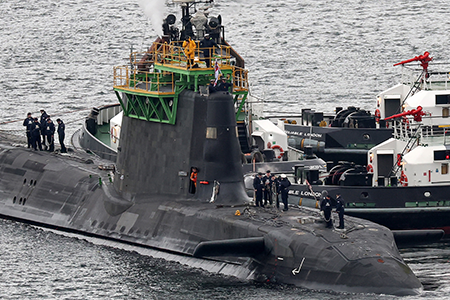
Yet, there are steps that Europeans can start taking, such as deepening French-UK cooperation, allowing France regular use of allied European airfields, undertaking explicit public deterrence messaging by prominent European politicians, and perhaps even soliciting financial support from a European coalition of the willing.20 Over the medium term if necessary, France could consider a small increase in its air-delivered munitions and possible French nuclear deployments to other European countries. The UK may think about reinstating its air-delivered nuclear component while seeking more independence from the United States for its nuclear program. All that would give France and the UK more escalation options against Russia and send reassuring signals to jittery allies in Eastern Europe.
Negative Consequences
There are undoubtedly downsides to European nuclear deterrence. It is expensive and will become even more so when extended to others. France just rushed to reopen a fourth nuclear airbase in response to Trump for $1.7 billion.21 Paris will soon feel the same pressure that Washington dealt with throughout the Cold War—namely, allies that constantly demand reassurance while never feeling fully reassured. Russia could exploit this effect, pushing Europeans into spending more and more on nuclear arms.
That is why conventional deterrence matters so much. It is the most cost-effective and credible way to contain Russia. It also could have the beneficial effect of bolstering Europe’s defense industry and making Europeans less dependent on U.S. military gear.
Establishing a credible European nuclear deterrent will deliver a severe blow to the global nonproliferation regime. Member states of the nuclear Non-Proliferation Treaty (NPT) would rightfully question whether any move to extend French and UK nuclear deterrence to Europe would be in line with the treaty. Despite the argument brought forward by German legal experts that financial support for French nuclear forces would not violate the NPT,22 politically, any such move could well mean the treaty’s death knell.
For that reason, Europeans would be well advised to complement deterrence with arms control. An arms control track could focus on conventional confidence-building measures along Europe’s long border with Russia and, over the medium term, possible limits on certain kinds of stand-off weapons most prone to cause crisis instability. The biggest obstacle to a purely European arms control approach could be Russia. For many years, the Kremlin has seemed hard-pressed to accept Europeans as independent security actors.
Whether Washington really will turn from protector to predator, and what that could mean for U.S. security guarantees to Europe, including the nuclear ones, remains to be seen. Ultimately, U.S. behavior will decide how far and how fast Europeans may go down the route of nuclear independence. All of this is more than deplorable from a nonproliferation perspective. At some point, however, a European nuclear deterrent could well be seen as the lesser evil. What if the French far right wins the presidential election in two years and declares a “France first” policy? No one should exclude anything at this stage of uncertainty in Europe, including a German or a Polish bomb.
ENDNOTES
1. Jan Cienski and Wojciech Kość, “Poland seeks access to nuclear arms and looks to build half-million-man army,” Politico, March 7, 2025.
2. Chris Lunday, “Europe should brace for Trump to end NATO protection, Germany’s Merz warns,” Politico, February 21, 2025.
3. “France’s Macron is ready to discuss nuclear deterrence for Europe,” Reuters, March 1, 2025.
4. Lauren Sukin, Michal Smetana, Marek Vranka, and Ondrej Rosendorf, “Are the United States and Europe still allies? The European public doesn’t think so,” Bulletin of the Atomic Scientists, March 26, 2025.
5. Julia Mueller, “Trump says he would ‘solve’ war in Ukraine in 24 hours if reelected,” The Hill, March 28, 2023.
6. Tristan Volpe and Ulrich Kühn, “Germany’s Nuclear Education: Why a Few Elites Are Testing a Taboo,” The Washington Quarterly, Vol. 40, No. 3 (2017): pp. 7-27.
7. Lunday, February 21, 2025.
8. Christian Lindner, “Europa muss an nuklearer Abschreckung festhalten [Europe Must Maintain Nuclear Deterrence],” Frankfurter Allgemeine Zeitung, February 13, 2024.
9. Iryna Nesterova, “The last peaceful summer in Europe: a German historian made an alarming prediction – BILD,” Ukraine Today, March 23, 2025.
10. Both arguments have been repeated in the German media for more than a year, for example, including by prominent politicians such as German Defense Minister Boris Pistorius; see Nicolas Camut, “Putin could attack NATO in ‘5 to 8 years,’ German defense minister warns,” Politico, January 19, 2024.
11. Ulrich Kühn, “The Fall Crisis of 2022: why did Russia not use nuclear arms?” Defense & Security Analysis, (2024, ahead of print): pp. 1-21.
12. Janice G. Stein, “Escalation Management in Ukraine: ‘Learning by Doing’ in Response to the ‘Threat that Leaves Something to Chance,’” Texas National Security Review, Vol. 6, No. 3 (2023): pp. 29-50.
13. Todd S. Sechser and Matthew Fuhrmann, Nuclear Weapons and Coercive Diplomacy (Cambridge, UK: Cambridge University Press, 2017).
14. Daniel S. Geller, “Nuclear Weapons, Deterrence, and Crisis Escalation,” Journal of Conflict Resolution, Vol. 34, No. 2 (1990): pp. 291-310.
15. Manuel Bewarder and Florian Flade, “Bereitet Russland einen Angriff auf die NATO vor? [Is Russia Preparing an Attack on NATO?],” Tagesschau, March 27, 2025.
16. David Brennan, “Trump says US will ‘go as far as we have to’ to get control of Greenland,” ABC News, March 27, 2025.
17. Ulrich Kühn, “Of Dependence and Conservatism: Conclusions for German Nuclear Policies in the 21st Century,” in Ulrich Kühn (ed.), Germany and Nuclear Weapons in the 21st Century: Atomic Zeitenwende? (London and New York: Routledge, 2024): pp. 302-314.
18. Michal Onderco, “German Public Opinion on Nuclear Weapons Before and After Russia’s Invasion of Ukraine,” in Kühn, Germany and Nuclear Weapons in the 21st Century, pp. 136-154.
19. Joseph de Weck and Shahin Vallée, “Germans Back Merz’ ‘Whatever It Takes’ on Debt and Defense,” Internationale Politik Quarterly, No. 3 (2025).
20. Héloïse Fayet, Andrew Futter, Ulrich Kühn, Łukasz Kulesa, Paul van Hooft, and Kristin Ven Bruusgaard, “Forum: European Nuclear Deterrence and Donald Trump,” Survival, Vol. 67, No. 1 (2025): pp. 123-142.
21. Laura Kayali, “France to reopen fourth nuclear air base as Europe rushes to rearm,” Politico, March 18, 2025.
22. Max Fisher, “European Nuclear Weapons Program Would Be Legal, German Review Finds,” The New York Times, July 5, 2017.
Ulrich Kühn is the director of the Arms Control and Emerging Technologies Program at the Institute for Peace Research and Security Policy at the University of Hamburg.
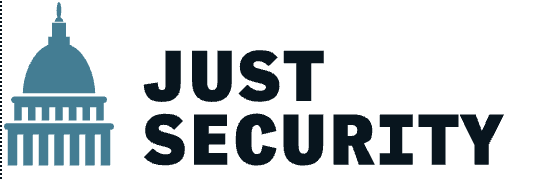 The fourth round of talks between Iranian Foreign Minister Abbas Araghchi and U.S. Special Envoy Steve Witkoff is about to kick off, with previous meetings injecting much-needed momentum into President Donald Trump’s push for a diplomatic resolution to the Iranian nuclear crisis.
The fourth round of talks between Iranian Foreign Minister Abbas Araghchi and U.S. Special Envoy Steve Witkoff is about to kick off, with previous meetings injecting much-needed momentum into President Donald Trump’s push for a diplomatic resolution to the Iranian nuclear crisis.
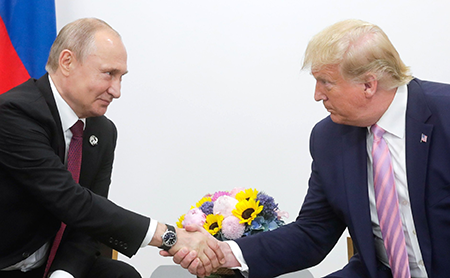
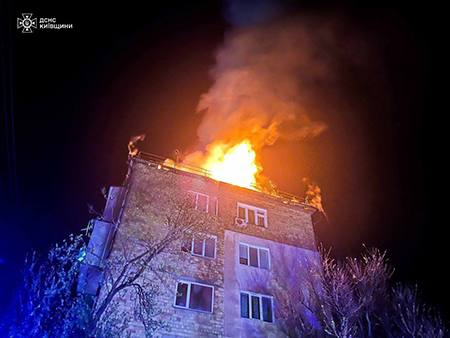
 A more immediate threat to the NPT is the future direction of Iran’s nuclear program. A decision by Iran to leave the treaty could trigger a crisis if Saudi Arabia, Egypt, and perhaps others follow Iran out the door on the grounds that the treaty no longer works for them. Moreover, the prospect of an Iranian nuclear breakout may invite Israeli or U.S. military preemption, which in turn would generate risks of a regional war. Adding greater urgency, Iran’s breakout time to develop a deliverable nuclear weapon has dropped precipitously since 2018 when Trump pulled the United States out of the 2015 nuclear deal known as the Joint Comprehensive Plan of Action.
A more immediate threat to the NPT is the future direction of Iran’s nuclear program. A decision by Iran to leave the treaty could trigger a crisis if Saudi Arabia, Egypt, and perhaps others follow Iran out the door on the grounds that the treaty no longer works for them. Moreover, the prospect of an Iranian nuclear breakout may invite Israeli or U.S. military preemption, which in turn would generate risks of a regional war. Adding greater urgency, Iran’s breakout time to develop a deliverable nuclear weapon has dropped precipitously since 2018 when Trump pulled the United States out of the 2015 nuclear deal known as the Joint Comprehensive Plan of Action.


